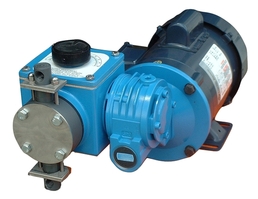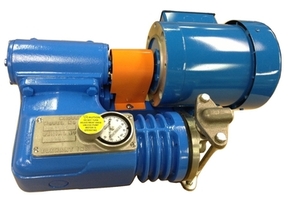There are many pumps available on the market for injecting chemicals into a process. So what makes one better than the other? This can be hard to break down, especially when you’re not only comparing brands to one another but also comparing different pump types. Gear pumps, piston pumps, peristaltic pumps, and diaphragm type pumps are all available pumps to consider when injecting chemicals.
Madden has been making chemical feed systems and durable diaphragm metering pumps for chemical metering applications for over 60 years now. And over those 60 years, Madden has stuck with the Diaphragm type metering pump design for chemical metering, because we believe it is the best type of pump for chemical injection for many reasons.
This article will go through the crucial features that allow Madden diaphragm metering pumps to accurately and repeatedly dose precise amounts of chemical into your process.
Features needed for the best Chemical Dosing System
1. Positive Displacement.
There are many positive displacement pumps on the market. Positive displacement pumps move chemicals or any liquid move by trapping a precise amount of the chemical in a chamber, and then forcing out that precise amount of chemical into a discharge line. Positive displacement are consistent with little to no variability in output, which leads to you knowing exactly how much chemical will be dosed into your system. Over the fiscal year, you can be confident knowing exactly how much chemical will be dosed by a positive displacement pump, thus knowing how much money you will need to spend on chemicals. Other types of pumps waste chemicals, which is directly wasting money.
Madden diaphragm type metering pumps utilize positive displacement. The way this is achieved in our pumps is through a check ball valve system. When the diaphragm draws back, the check ball in the suction end of the pump floats up, allowing a precise and repeatable amount of chemical to enter the solution head chamber. At the same time, the check ball on the discharge end is pulled down and seats firmly, making sure no chemical re-enters or leaves the solution head chamber. When the diaphragm then pushes forward, the exact opposite happens, forcing the precise amount of chemical out of the chamber and into the discharge line.
Madden heavy duty pump is designed to do this 24/7/365 with very little maintenance required.
2. Chemically compatible materials
Once you know you’re getting a pump that is accurate and consistent, the next thing needed is chemically compatible materials. Some chemicals like sulfuric acid, sodium hydroxide, sodium hypochlorite, etc., can be corrosive. You need to make sure your positive displacement pump’s wetted end is completely compatible with the chemical you are pumping; otherwise, you will be replacing the pump over and over again.
Madden chemical metering pumps have wetted end materials to handle any chemical addition need. From 316 stainless steel solution heads to plastic Teflon heads, we have a material to handle your chemical. Not every positive displacement pump is going to have these options.
We use some of the thickest rubber diaphragms on the market. This paired with a very short stroking length equals a long service life for the diaphragm pumping the chemical. Teflon, Viton, and Hypalon are a few examples of the diaphragm materials we can offer you. And, when they do eventually fatigue check out this YouTube video showing just how quick and easy it is to replace one. You won’t find many other metering pumps as durable and easy to repair as Madden.
3. Consistent and Durable Driving Forces
Lastly, what is going to run all of these components? What will drive them? You want something that will hold up to strenuous conditions for a long service life. Some metering pumps are solenoid driven and those magnets can wear out quickly. Once worn out, these pumps are thrown away and new replacements are bought and installed.
Madden chemical injection pumps use heavy duty metal parts to drive the diaphragm back and forth with standard size electric motors. Using standard motors allow us to stock motors, it also means in cases where an emergency pump is needed, Madden can assembly, paint, and test a pump to get it out the same day or the next. That said, we also offer hazardous duty, mill and chem duty, washdown duty, 50 Hz motors, DC motors and inverter duty motors to meet any application’s requirements.
These motors are driving a shaft, which in turn drives either an eccentric, or eccentric and rod, which is connected to the piston and diaphragm. The motor speed is reduced by a worm gear and sprocket installed on the pump’s drive shaft. With every turn of the drive shaft the piston and diaphragm stroke at a specific length… over and over and over again. Which brings us back to our first point, consistency and accuracy in your chemical metering.
 Conclusion
Conclusion 
So if you have a demanding chemical addition process and are looking for the right pump, consider a Madden chemical metering pump. We’ve built and stuck with our durable design for over 60 years now because it still continues to exceed expectations.

 Conclusion
Conclusion 